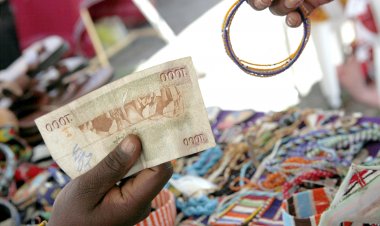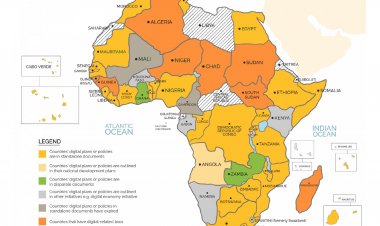The Burgeoning African Digital Economy
It is projected that the digital economy will contribute USD 180 billion to the economy of Africa by 2025. This will undoubtedly improve the quality of life for Africans across the continent through increased economic growth, career opportunities and improvement of tech-facilitated service delivery. Digital platforms have increased access to education, agriculture, and health care. This demonstrates that there are numerous advantages to investing in Africa's digital sector.
The past few decades have witnessed a surge in investment and infrastructural development in the African digital economy. 359 African technology start-ups secured funding in 2020 alone as opposed to the 55 that secured funding in 2015. Between 2015 and 2021, African fintech start-ups secured nearly 900 million dollars in funding. Private sector involvement in establishing Africa's digital economy has increased in recent years. This has been instrumental in driving growth in Fintech and other sectors in Nigeria, Kenya, and South Africa.
The AfCFTA and Africa’s Bid to Become a Single Digital Economy
One of the primary goals of the African Continental Free Trade Agreement, which was founded in 2018 (with trading beginning in early 2021), is to encourage trade among African countries while ensuring economic growth and development. The agreement has the potential to create the world’s largest free trade area through commitments by state parties on trade harmonization and liberalization. In principle, this means that African countries should aim to eliminate trade obstacles and create a single economy similar to that of the European Union.
In the agreement, member states commit to cooperate in the area of quality science and technology infrastructure and to promote research in the technology sector to accelerate social and economic development. In addition, the agreement covers investments, intellectual property rights and competition policies. In theory, the implementation of the AfCFTA will significantly improve the digital economy within Africa by bolstering its ability to negotiate as a bloc during trade talks, attract investment for start-ups with a large market and, most interestingly, promote the adoption of a single currency to facilitate ease of payment within African countries.
What’s standing in the way of this digital dream?
Africa's digital economy continues to lag behind and falls short of global standards. For example, across the continent, African countries still have internet speeds below the global minimum standard.
The Digital Transformation Strategy for Africa states that inadequate digital capacity, lack of an entrepreneurial ecosystem, weak ICT industries and service sectors and insufficient financial investment are among the many challenges to the digital strategy in Africa. In addition to these existing barriers, despite the surge in fintech start-ups, Africa does not have an efficient payment system. In fact, the foreign payments issues that confront Africa have not only become a concern for countries themselves but for regional and international institutions.
Furthermore, the African Union acknowledged that one of the weaknesses of the African Union is the lack of cooperation among continental actors and a weak framework for the monitoring and implementation of the digital transformation strategy. African countries have to ensure that the AfCFTA is adequately implemented by involving the input of different stakeholders and adjusting the top-down approach of the AUC. Without this, trade restrictions that existed prior to the agreement will continue to exist. Evidently, when it comes to policies concerning the digital economy, a coordinated approach is lacking. Only 8 out of 54 countries ratified the Malabo Convention on Cybersecurity and Personal Data Protection.
Individual African countries are passing policies on cybersecurity, data protection, digitalization strategies and national development plans. However, both individually and as a bloc, it appears that African leaders are doing far too much policymaking and far too little policy implementation.
European Union Policy towards Africa’s Digital Economy
The European Union (EU) is one of the most important partners of Africa. Europe is one of the largest investors in Africa with a stock of €239 billion in Foreign Direct Investment as of 2018. In 2019, the European Investment Bank invested up to EUR 500 million in support of African start-up companies in the digital sector amongst others.
However, regardless of the significant investment of the EU in Africa, there has been minimal investment in the rapidly growing digital economy on the continent, especially when compared with initiatives by China, the United States, and the United Kingdom. These three countries capture 70% of all cross-border e-commerce trade with Africa, while most of the EU’s effort in the digital economy has been directed towards exporting regulations and soft skills. Given this slow start in adopting a meaningful and coherent digital strategy, the EU appears eager to establish their digital dominance globally and may well find an unlikely ally in Africa.
In 2015, the heads of European Union and African Union member states held a summit. In the resulting declaration they made commitments to invest in youths for the purpose of economic growth and development, and both sides agreed to exchange ICT policies and regulatory frameworks that further commit to investing in digital infrastructures. However, there are growing concerns that investment flows are largely directed towards European entities rather than African entrepreneurs. For example, under the EU External Investment Plan, the European Commission signed guarantee agreements with six European institutions, namely the European Bank for Reconstruction and Development (EBRD), the European Investment Bank (EIB), the German KfW Group, the Spanish Agencia Española de Cooperación Internacional para el Desarrollo (AECID), the Dutch Development Bank (FMO). It also facilitates cooperation between Cassa Depositi e Prestiti (CDP), the Italian Development Bank, and the African Development Bank (AfDB).
The EU is active in supporting the AU in developing policies related to emerging technologies such as digital identification, data governance and cybersecurity through initiatives such as the Policy and Regulation Initiative for Digital Africa (PRIDA). In 2018, the European Commission and the African Commission launched an AU-EU Digital Economy Task Force which worked on digital entrepreneurship and connectivity among other issues. The task force made recommendations on 4 major areas:
- Access to affordable broadband connectivity and digital infrastructure
- Digital skills
- Digital entrepreneurship
- e-Services (e-Government, Smart Cities, e-Commerce and eHealth).
Presented in the New Africa-Europe Digital Economy Partnership report, the AU-EU Digital Economy Task Force recommends “promoting a favourable regulatory environment for competitive and harmonised regional markets in the field of connectivity”, “adapting the local regulatory framework to the Digital Economy at all levels throughout the value chain” and “integrating the provision of eServices, developed by both the public and private sector, with adequate legal acts and regulation at all levels”. Though this effort is presented as a joint initiative, there is little mention of it in AU proceedings.
Can we Regulate Our Way to Prosperity?
The EU’s commitment to the digitalization of the African continent is commendable. Yet there are several points emerging from the EU-AU strategy concerning the export of regulation that must be taken into consideration.
Firstly, the AU, unlike the EU, often works through “soft laws" which tend not to have any legally binding force for member states. As such, it is important to consider different perspectives, needs, challenges and inputs from the ground, rather than developing purely top-down continental policies to ensure agreement, ratification and implementation.
Secondly, an analysis of how countries regulate novel technologies show starkly different approaches to the innovation ecosystem. For example, the United States tends to underregulate and currently wields global technological and cultural hegemony. The EU, on the other hand, is often quick to regulate, stifling innovation and creativity in the process. This isn’t to say that we should let big tech run wild and unfettered, but that we should find a happy medium.
An example of overregulation stunted innovation can be seen in the success of mobile money in Kenya and East Africa versus its failure in Nigeria in spite of its high telecommunication penetration. In Kenya, 72% of the population has a mobile money account, compared to 29% with a bank account (with 73% considered financially included). In Nigeria and West Africa, central banks legislated more heavily against the telecom-led mobile money industry resulting in an unfavourable regulatory environment. Consequently, only 3% of the population of Nigeria has a mobile money account and only 30% are considered to be financially included. While effective regulation may create an improved regulatory environment for investors in Africa, overregulation could prove detrimental to innovation and hinder its potential benefits.
The third point to be taken into consideration is the ways in which authoritarian governments across Africa often use regulatory tools as a means to implement regressive policies. These include the imposition of social media and digital taxes on citizens, hate speech bills, the censorship of digital platforms and fintech, imposing crushing taxes on small businesses and impeding cross-border payments and banking. These strategies stand to derail the ambitious and citizen oriented visions of digital transformation strategies.
Finally, Africa is not Europe. Drafting and spreading regulations formed in a European context throughout the African continent is detrimental, and such a culture of directly transferring working policies from one context to another impedes Africans from conceptualising their own digital future.
Where do we go from here?
The EUR 239 billion in Foreign Direct Investment (FDI) to Africa quoted earlier in this article represents only 2.7% of the total investments of EUR 8,750 billion made by residents of the EU by the end of 2018. This is in spite of the EU being Africa’s largest trade in goods partner, forming 28% of both exports and imports in 2020. This discrepancy can be addressed by further encouraging private sector investment and facilitating private sector linkage to the EU single market. Such input would accelerate the demand for and development of digital skills, generate a stronger private-public infrastructure, increase trade, increase networking and improve the quality of life across the continent.
Africa is one of the world's fastest-growing economies. Nonetheless, it lacks digital infrastructure and access. It would be better positioned as a hub of innovation with investment from the European Union, enabling it to bolster its own digital single market for goods and services. Signing the African Continental Free Trade Area (AfCFTA) could provide a significant boost if governments take steps to ensure private sector investments are encouraged and linkage with Europe is facilitated. For this to happen, it is important to carefully craft indigenous legislation that works for the betterment of all African citizens by taking a broad range of perspectives into account, from civil society, the private sector and from citizens themselves. Lastly, listening to and understanding local contexts and committing to true partnership will be key to a sustainable digital strategy between the EU and African states.
About the Author
Neema Iyer is an artist and a technologist. She is the founder of Pollicy, a civic technology organization based in Kampala, Uganda and is a co-host on the Terms and Conditions podcast. She currently leads the design of a number of projects focused on building data skills, on fostering conversations on data governance and digital security, and on innovating around policy




